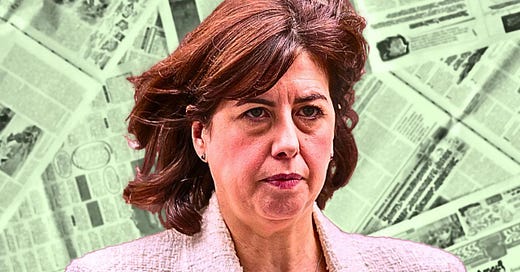The Continued Dismissal of the Grooming Gang Scandal
When the truth is politically inconvenient for our leaders
I was having lunch at a friend’s house recently when a photo of Axel Rudakubana came up on the TV. As soon as she saw it, my friend sighed and shook her head. “Why do they always use that photo?” she said. “They just love making him look like a monster.”
Rudakubana brutally murdered three children and attempted to take the lives of ten more. The attack, a calculated act of terror, took place at a Taylor Swift-themed dance class in Southport. He was in the news again for allegedly assaulting a prison officer. Yet here was my friend, more concerned about the optics than the lives shattered by Rudakubana's unspeakable act.
These days, judging people by their actions often feels like asking too much. If a wrongdoer happens to belong to the 'right' group or ticks the correct demographic boxes, attention quickly shifts from what they did to how they’re portrayed.
As Inaya Folarin Iman recently noted, certain identities have become untouchable in our cultural landscape.
But it’s one thing when private citizens engage in this kind of moral distortion; it’s another when our leaders do the same. Lucy Powell, the Leader of the House of Commons, made a similar 'mistake' not long ago on BBC’s Any Questions?, when she brushed off a question about the grooming gang scandal as 'dog whistle politics.'
The grooming gang scandal is a stain on this country – a deep, stubborn mark that no amount of political avoidance can scrub away. It’s like a dark blotch on a white shirt—you might try to ignore it, but it’s always there: obvious and unmissable. When those in positions of power – our politicians and institutional leaders – choose to deflect or dismiss concerns about this scandal rather than confront the uncomfortable truth that it happened on their watch, it doesn’t make the stain disappear. If anything, it just deepens the mark and continues to erode public trust.
Back then, the excuse from those who were meant to protect these girls but didn’t was that they didn’t want to cause community tensions or risk being labelled racist. Now, we find ourselves in a moment when those responsible for pushing for justice and accountability are again hesitant to speak out, afraid of “empowering” the far right.
But don’t they ever stop and consider that their constant dismissal is, in fact, a gift to those who would prefer we look away? The perpetrators were mostly Pakistani men who, for decades, systematically preyed on and dehumanised mostly young, white girls. I’m sure they are relieved that they can still hide behind the protective cloak of their identity.
Those who speak loudest about justice and equality are often the first to avert their eyes when the facts challenge their preferred narrative. They preach about the need to protect vulnerable communities, yet abandon those same communities when it becomes politically inconvenient.
When the backlash inevitably came, Powell took to X to “clarify” her comments:
“In the heat of a discussion on AQ, I would like to clarify that I regard issues of child exploitation & grooming with the utmost seriousness. I’m sorry if this was unclear. I was challenging the political point scoring around it, not the issue itself. As a constituency MP I’ve dealt with horrendous cases. This Gvt is acting to get to the truth, and deliver justice.”
But there was no direct acknowledgment of the specific harm caused by her dismissive language. Instead, she pivots immediately to political point-scoring.
If Powell truly takes this issue with the “utmost seriousness,” why not recognise that minimising this scandal as a “dog whistle” or “blowing that little trumpet” is exactly the kind of language that makes survivors feel invisible?
Of course, many on the right can co-opt these tragedies to inflame tensions and push their own political agendas. But this is precisely why mainstream media and politicians must confront these issues head-on, with clarity and moral courage.
And let’s be clear; it isn’t the right that inherently causes these tensions. It’s the cowardice of those in authority who, in their desperation to avoid uncomfortable conversations, hide behind the shield of identity politics.
In truth, it’s not the act of talking about these issues that stokes division. It’s the act of ignoring them, the attempt to sanitise uncomfortable realities in the name of cultural sensitivity.
What Powell casually dismisses as a “dog whistle” has been the utter devastation of countless lives – overwhelmingly those of young, working-class girls, the very people you might expect the left to champion. These are the same voices who regularly rally against violence against women, who pride themselves on standing up for the vulnerable. Yet, when the perpetrators belong to a group that the progressive orthodoxy considers higher up the hierarchy of victimhood, these same voices suddenly fall silent or worse, become apologists.
Hi everyone – Ada here,
Thanks so much for reading. Before you go, a quick heads-up: The Equiano Project’s event, “After Woke: What Comes Next?” is happening on Thursday 29th May in London
Don’t forget to grab your ticket! It’s going to be a fantastic evening with Musa al-Gharbi, Ralph Leonard, and Helen Lewis. Followed by informal drinks!
🎟️ Tickets are £10–£15 and you can grab one here.
Hope to see you there :)






Absolutely well said
Here’s an example of why incentives for politicians encourage behaviours like that of Lucy Powell when it comes to issues like the Grooming Gangs:
https://substack.com/@anotherdabblingdilettante/p-161515847